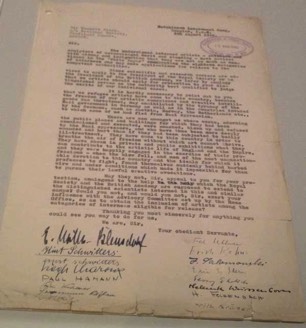
Hutchinson Internment Camp Letter 8th August 1940 (Full Text)
Hutchinson Internment Camp,
Douglas, I.o.M.
8th August 1940,
Sir Kenneth Clark,
c/o National Gallery
Trafalgar Square,
LONDON.
Sir,
The undrrsigned interned artists – painters and sculptors of acknowledged merit and standing – have noticed with dismay and indignation they are not so much as mentioned in the 'White Paper' enumerating the eighteen categories of internees who may make applications for release to the competent authorities.
Since scientific and research workers are advised to apply to the President of the Royal Society or to the President of the British Academy, we infer by analogy that we artists should apply for protection to your distinguished person as the authority best qualified to judge the merits of our individual cases.
It is hardly necessary to point out to you that we refugee artists hare come to this country, because the freedom of our artistic conscience and creative intelligence was threatened, nay annihilated by the tyranny of the Nazi government in Germany as well as in the countries invaded by the Germans, such as Austria, Norway, the Netherlands etc., to which some of us had fled from Nazi oppression.
There are men amongst us whose works, adorning the public places and building for which they had been commissioned and executed, were smashed, blown up and defaced by the Nazi oppressors, and who have thus been more deeply wounded and hurt than if they had been subjected to bodily ill-treatment. They have come to this country in order to breathe the air of freedom without which art cannot thrive. They have shown in private and public exhibitions what they can contribute to the artistic life of England and the Empire, and they were happily engaged in the exercise of their professions – when the blow fell, and men of the most unquestionable devotion to this country and the Ideals for which it professes to fight, found themselves suddenly behind barbed wore and under conditions which made it impossible for them to pursue their lawful creative avocations.
May they not, Sir, appeal to you for your protection, analogous to the help which the Royal Society and the British Academy are supposed to extend to the distinguished scientists interned in this and similar camps? Could you not, and would you not, Sir, exert your influence with the Advisory Committee set up by the Home Office, so as to obtain the inclusion of artists among the categories of internees eligible for release?
Thanking you most sincerely for anything you could see you(r) way to do for us,
We are, Sir,
Your obedient Servants,
The letter is signed by the following Ernst M. Blensdorf, Kurt Schwitters, Ernst Schwitters, Siegfried Charoux, Paul Hamann, Fritz Kraemer, Hermann Roessler, Carl Felkel, Fred Uhlman, Erich Kahn, Fred Solomonski, Erich E. Stren, Georg Ehrlich, Hellmuth Weissenborn, and Hermann Fechenbach.
© 2021 • Site by numodesign.com